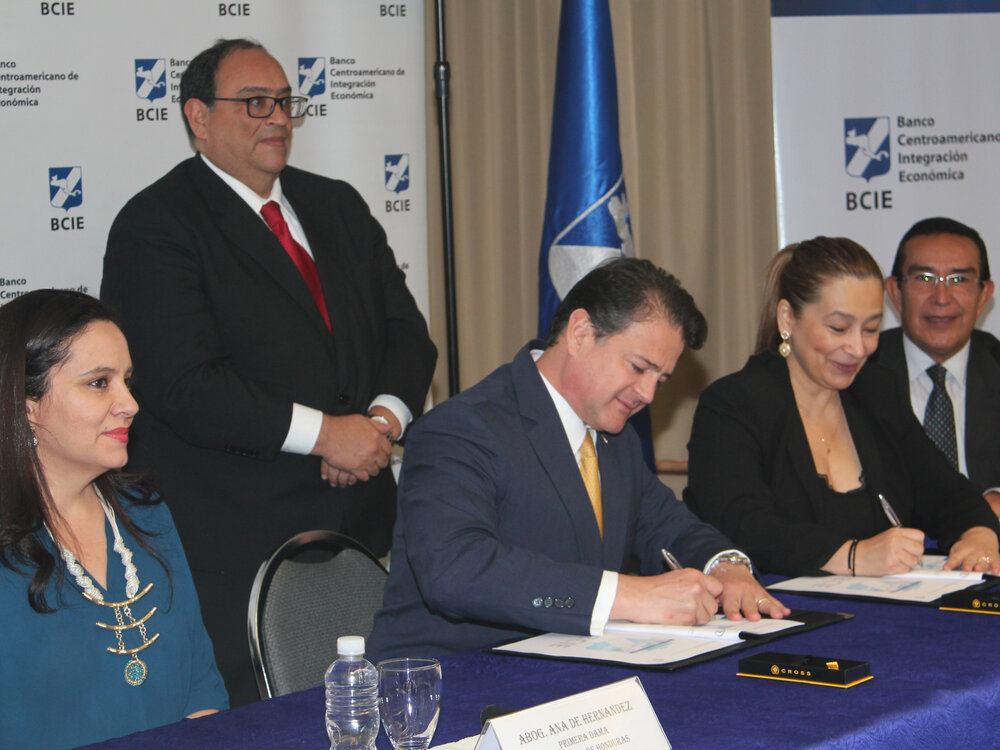The health and well-being of Hondurans is strengthened with the support of CABEI

A non-reimbursable financial assistance of US $1 million will allow for the expansion of the capacity of the Gabriela Alvarado Primary Hospital in Danlí and the Santa Teresa General Hospital in Comayagua.
CABEI supports the country in its efforts to achieve the third Social Development Goal on health and well-being in Honduras.
Tegucigalpa, August 21, 2018.- The Central American Bank for Economic Integration (CABEI) made a donation today of US $1 million to the Government of the Republic of Honduras. The funds from this non-reimbursable grant will be used to support the project entitled "Equipping Critical Areas of the Gabriela Alvarado Primary Hospital in the city of Danlí and the Santa Teresa General Hospital in the city of Comayagua".
The purpose of this cooperation is to ensure uninterrupted care of health services, reduce surgical delays, and decrease the neonatal and maternal mortality rates, in line with the country's priorities through the provision of equipment for the neonatal intensive care and labor and delivery areas of both hospitals.
Also, with this donation, CABEI expects to expand the capacity of the two hospitals by providing medical equipment in critical areas of neonatal care (Labor and Delivery, Neonatal Intensive Care Unit), purchase an ambulance for each hospital, and provide a power plant for the Santa Teresa General Hospital. This includes related services that guarantee training to the personnel responsible for the use of the equipment.
At the signing ceremony, Alejandro Rodríguez, CABEI Executive Vice President, said, "CABEI reiterates its commitment to the Republic of Honduras, with whom it maintains a portfolio of current operations for US $1.065 billion focused on different projects in the areas of productive infrastructure, energy, human and social development".
"With these resources we have contributed directly to the development of the country's road infrastructure through the financing of the primary road network such as the Jícaro Galán-Tegucigalpa highway; the Logistics Corridor; and the Western Corridor, among others," he stated.
CABEI will continue to focus its interventions on improving the human potential and quality of life of the population, which is why the support is focused on programs and projects that improve access to drinking water and basic sanitation sources, and a greater coverage, efficiency and effectiveness in the provision of health services; such as: the Rural Infrastructure Program (PIR), which has provided access to social infrastructure (water, sanitation and electrification) to poorer rural populations in different parts of the country, benefiting nearly 44,000 people; and the Multisectoral Program, which improved access to drinking water and school meals, among others.
With this development intervention, CABEI continues to support projects that are aligned with its 2015-2019 Institutional Strategy "Integrating Sustainable Development and Competitiveness", specifically in the Social Development Axis, through the focus area of Human Development and Social Infrastructure.
CABEI's donation will expand access to health care for Hondurans
According to the Honduran Ministry of Public Health, the Gabriela Alvarado Hospital was built in 1975 in the city of Danlí, in the department of El Paraíso, with a population of over 200,000. This hospital is responsible for providing level II care and the only one in the eastern part of the country to provide 24-hour care with permanent surgical services offered to the population of El Paraíso and some municipalities in Olancho.
As for the General Hospital of Santa Teresa, which was reopened in 1987, it is located in the city of Comayagua, department of Comayagua, with a population greater than 150,000 inhabitants. This hospital is responsible for providing specialty care to patients referred by the primary hospital.
Currently this hospital has a surgical delay of 42 patients, 179 patients on the waitlist, and it has not been able to meet some health care standards in neonatal care due to the lack of equipment, equipment in poor condition, the constant risk of an interruption in the city's electricity flow without an alternative system within the health facility, and the growing demand it faces.







![[Translate to English:] [Translate to English:]](/fileadmin/_processed_/b/8/csm_Web_El_Progreso_2_b98363a150.png)
